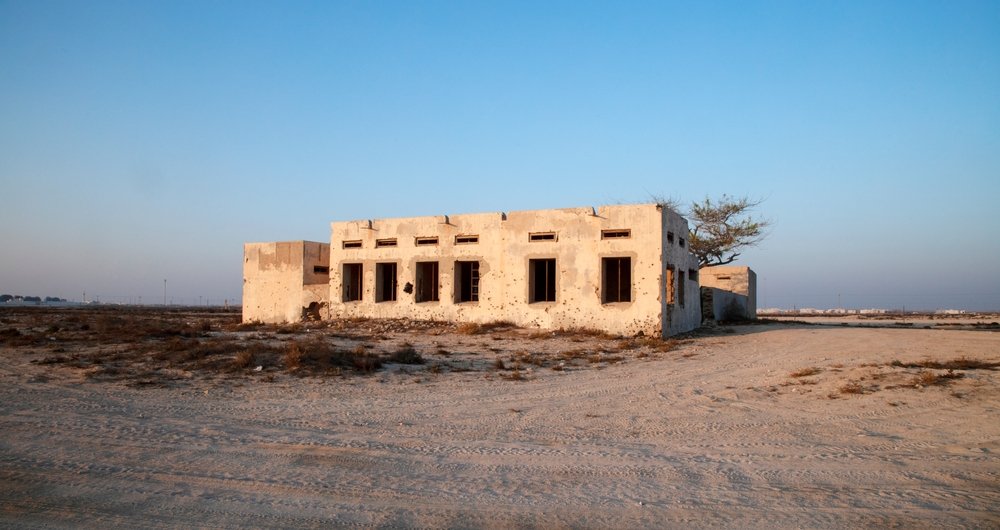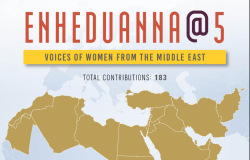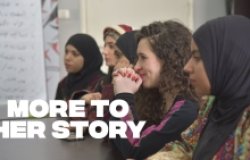
A blog of the Middle East Women's Initiative
Amna Al-Jaydah: Qatar’s First Female Teacher and Icon of Empowerment
Hind Al Ansari profiles the first female teacher in Qatar, Amna Al-Jaydah, who established the first official school for girls, profoundly altering the course of Qatar’s national development.

In 1957, 122 girls joined Al-Jaydah’s semi-official school. A little under a decade later, 13 more girls’ schools opened, and in total, there were about 3,176 female students—a staggering surge against the backdrop of apprehension.
In today’s Qatar, we celebrate the remarkable strides women have made in shaping a nation that is both young and ambitious. The differences between the generations—mine, my mother’s, and my grandmother’s—are not just stark but also profound. Listening to my mother’s and grandmother’s childhood stories transports me to a time that seems far more distant than it truly is. When I stroll through the neighborhood where my mother and her siblings were raised, near the vibrant gold souq and Souq Waqif area, I am reminded that their era was marked by simplicity in many aspects, a significant contrast to the cosmopolitan life we live in today.
While my mother, Noora, witnessed the early fruits of the country’s development, my grandmother, Aisha, grew up in the pre-oil era when the British Empire still had a significant role in mediating between influential local tribes, some of whom became the monarchical families ruling the independent Gulf states today.
My grandmother does not know her exact age. Her education was limited to kuttab, Quranic school, where she learned reading and memorizing the Quran. Despite being illiterate and having limited understanding of the value of formal education, she gave birth to and raised a generation of twelve educated men and women, all of whom completed college-level education.
In my mother’s generation, women’s access to education was not simply a result of oil-driven transformations. There was one woman who bravely defied the odds and challenged the gendered-notions that limited females’ roles to the private sphere: Amna Mahmoud Al-Jaydah.
Al-Jaydah's tremendous efforts
Al-Jaydah was a reputable teacher who ran her own kuttab. In fact, my grandmother and her sisters were students of hers.
“We gathered in a circle in one of the neighborhoods, and we sat under a shaded area to protect against the sun. Amna Al-Jaydah used to sit on a chair and recited the verses. We repeated after her. After that, she asked each one of us to recall the verses without looking at the text. The constant repetition helped me memorize many parts of the Quran that I still remember,” said my grandmother’s sister, Sharifah, who attended her first kuttab at the age of nine. “She was a lovely teacher, but she was also strict. She wanted to make sure we all learned properly.”
To honor her legacy, Dr. Badreya Al-Ammari, an associate at Qatar University, conducted a biographical study documenting Al-Jaydah’s role in actualizing formal education for women. She revealed that the first formal school for girls in Qatar did not emerge until 1957, nearly a decade after the boys’ school was established. This delay can be attributed to several factors, including societal unpreparedness for the rapid economic development, the demands brought about by the discovery of oil, and the subsequent changes they would bring to the country’s gender roles. For instance, my grandfather, Ahmad, managed a family business, and in his absence, my grandmother was responsible for caring for the children, teaching them the Quran and instilling in them the values that their society upheld.
When Al-Jaydah sought official recognition from the state for her school and proposed to expand girls’ education to the then leader, Sheikh Ahmad Al-Thani, she was met with resistance from both government and society at large. Many community members were apprehensive about the impact that formal schooling might have on what was considered the sacred role of women. Similarly, the leader was concerned about potential backlash from his people. However, Al-Jaydah was not deterred by their skepticism and suspicion, and she continued to make her case to Sheikh Ahmad, who had the power to officially change course.
The first school for girls
In 1957, her perseverance finally paid off when her kuttab was officially recognized as the Doha Primary School for Girls. Soon after, other schools for girls opened, and the number quickly soared.
As expected, however, the formal transition to schooling did not mitigate societal opposition. Despite support from the head of state, suspicion over the efficacy of girls’ education persisted. In some areas, parents sent people to girls’ schools to report exactly what was being taught.
Given the extent of resistance, the government opted to classify girls’ schools under a provisional category, allowing them to close the schools if there was ever a need. Notably, the government’s lack of definitive stance showcases the power that societal members had over the nation-state during its early phases of establishment.
Although some girls dropped out due to continued resistance, others remained to complete their education. In fact, in 1957, 122 girls joined Al-Jaydah’s semi-official school. A little under a decade later, 13 more girls’ schools opened, and in total, there were about 3,176 female students—a staggering surge against the backdrop of apprehension.
Some of those who completed their secondary education enrolled at then newly founded Qatar University, while others traveled abroad to Arab or Western countries to begin their university studies.
Although their numbers were modest in the beginning, the enrollment of women in a variety of professional fields was crucial to challenge outdated beliefs that limited women’s professional opportunities and to normalize their participation over time. Without their endurance, women today might still be fighting to become engineers, doctors, or pilots.
As women in Qatar continue to compete alongside men in various sectors and take over leadership positions, they honor the legacy of Qatar’s first female teacher, Amna Mahmoud Al-Jaydah. It is difficult to imagine how girls’ education would have commenced without Al-Jaydah. Her bravery is a testament to how a woman at the grassroots level can have everlasting impact on societal norms and alter the course of future generations.
The views expressed in this piece are those of the authors and do not express the official position of the Wilson Center.
About the Author

Hind Al Ansari
Ph.D. Candidate, Faculty of Education, Cambridge University

Middle East Program
The Wilson Center’s Middle East Program serves as a crucial resource for the policymaking community and beyond, providing analyses and research that helps inform US foreign policymaking, stimulates public debate, and expands knowledge about issues in the wider Middle East and North Africa (MENA) region. Read more

Middle East Women's Initiative
The Middle East Women's Initiative (MEWI) promotes the empowerment of women in the region through an open and inclusive dialogue with women leaders from the Middle East and continuous research. Read more










